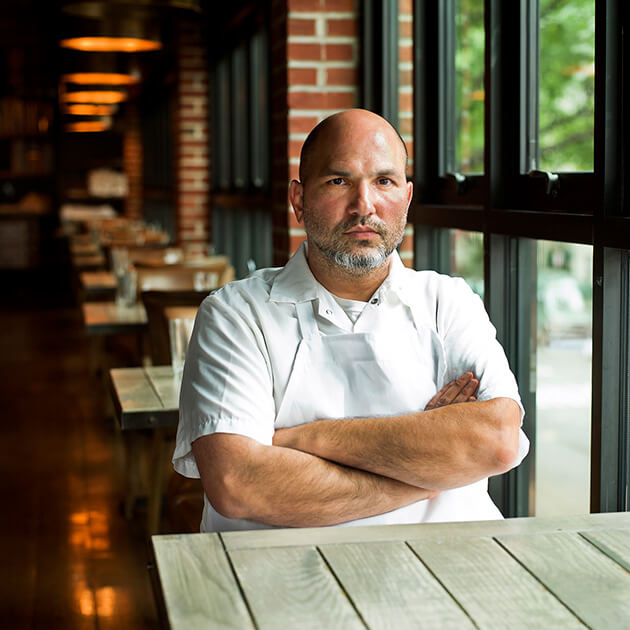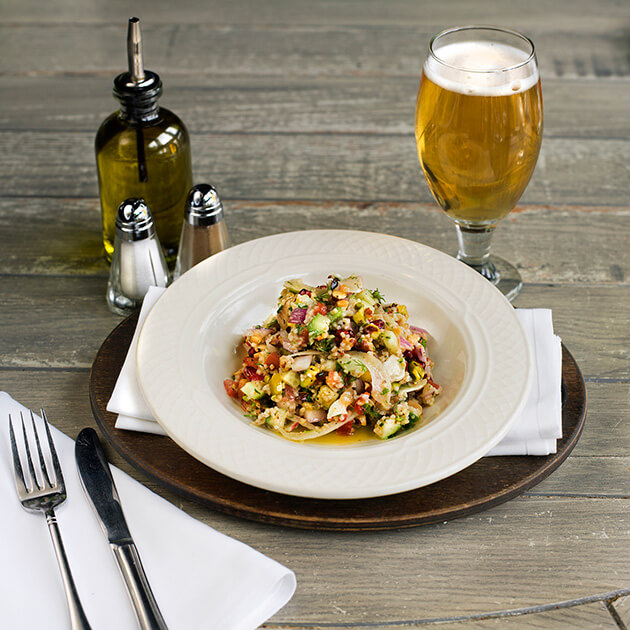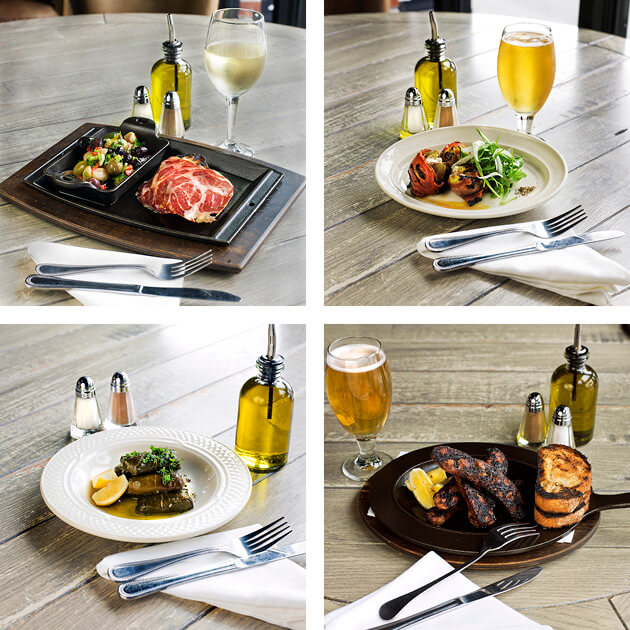Taverna on Driggs: Michael Psilakis Comes to Brooklyn


All photos by Joe Hume
IT WOULD HAVE BEEN EASY for Michael Psilakis to cultivate a career exclusively in Manhattan. Often referred to as the “Godfather of Greek Cuisine,” he made his name at upscale restaurants like Onera and Dona; he’s received James Beard Award nominations, as well as Chef of the Year distinctions from Bon Appétit and Esquire; he’s published a top-selling cookbook, and has banked enough television appearances (BBC America’s No Kitchen Required, Food Network’s Best Thing I Ever Ate) to cement his status as a bona fide celebrity.
But instead, Psilakis has worked especially hard to establish his MP Taverna brand well outside of New York County with a branch in Astoria, two more on Long Island, and a forthcoming outpost in Williamsburg that will boast an adjunct art gallery providing a showcase for undiscovered painters, sculptures, poets, street performers, and the like.
We chatted with Psilakis about his mission to create and recreate memories through food, why he truly admires Guy Fieri, and the thrill of choosing china patterns in the White House.


Bulgar salad with pomegranate, soaked almonds, pistachio, medjool dates, peppers, onions, cucumber and herbs.
So, first things first: talk a little about the new Brooklyn branch of MP Taverna!
The restaurant is divided into three different units, with the beer hall on one side and the tavern on the other. And then there’s a smaller section on the tavern side, which is intended to be a Greek market. It won’t be ready for opening, though, due to all the moving parts involved. Brooklyn has an industrial yet rustic feel… kind of like a hybrid of MP Taverna in Astoria and Kefi on the Upper West Side. Definitely not the typical blue and white scheme you’ll find in many Greek restaurants, because we don’t try to ‘message’ Greekness through any other medium but food.
And will the food offerings remain the same throughout all of the different spaces?
There will be totally separate menus, with the tavern taking a more creative approach to Greek food, and the beer hall concentrating on simple street food and mezze. Think kebabs, dolmas, pides, and salads, with 30 beers and 10 wines on tap, and a “make your own” cocktails program. It’s designed around the idea of people coming in big groups and having fun together. So there will be one type of bourbon, but a whole portfolio of bottle sizes; you can get a tiny airplane bottle, a fifth, or whatever. And it will arrive with whatever mixes you choose, along with ice.
One thing that sets the Williamsburg branch very much apart from all of your other MP Taverna concepts is your gallery and performing art space, correct?
There’s a whole lot going on in the beer hall side, that’s for sure. There’s a big stage along the back end, with a 20-foot movie projector screen on the wall. And the entire room will serve as showcase for all kinds of art. Digital art on the screens. Fine art on the walls. Sculptures. Poetry and dancing on the stage, depending on whom the curators decide to book. And street artists as well, engaged to perform on the floor. It’s all about interactive art, combined with great drink and food.
How did you arrive at this particular concept for Williamsburg?
Whenever I try to come up with a new concept, I sit down with an empty piece of paper and just start writing down words that mean something to me, that also connect with the space or neighborhood. And in Williamsburg, one of the words that kept coming to me was “renaissance.” I just feel like Williamsburg really embraces raw art forms, like woodworking or metal working, that just aren’t found anywhere else anymore. And the restaurant needed to evoke that. That’s why the gallery is especially intended for street artists, for unknowns. I especially envision a lot of artists coming in during the day, during slow hours, when they’ll have a big, empty space at their disposal for painting and drawing and hanging out. The hope is that it becomes an arena of artistic expression.
What’s your own personal connection to art?
I had a very philosophical approach to cooking early on in my career. I always looked to articulate stories through food. It was my art form. I used it to capture moments, memories, emotions. Food was like that for me for about 10 years. But when my father passed away it transitioned, because almost all my memories with him revolved around food. I realized that food is merely a vehicle to gather the people you love around you in order to create memories, and those memories are what make the actual experience of eating so valuable. That’s when I sold all my Italian restaurants and started cooking food like this. I moved away from the idea of “Don’t talk to the guy next to you, just eat my food” — which is very arrogant but I liked it at the time — to creating an atmosphere that allows people to make memories together.
Besides your own, you don’t see many higher-end Greek dining concepts in NYC. Why do you think the cuisine has yet to garner the same widespread respect as, say, French, Italian, or Japanese?
It’s all about evolution. Dining experiences have evolved so much over the last 10 years, because the diner’s intellect about food has evolved. Italian food wasn’t always what we know as Italian food, but due to constant exposure, now we’re speaking Italian words as if they’re English words. So now, similarly we’re trying to demystify what Greek food is.
And what is Greek food?
Essentially, if Italy and Turkey had a love child, it would be Greece, due to topography and conquest. We use the same ingredients as Italy — tomato, eggplant, garlic, onions — but with the aromatics that Turkey brought down, like clove and cumin and cardamom. It’s simple, rustic, soulful cooking. But as I said, what we haven’t seen in Greek food, as opposed to Italian food, is an evolution. Most of the Greek restaurants have not, until recently, been able to move past the idea of grandma and mom cooking in the kitchen. So I’ve chosen not to replicate my mother’s Greek food… it reflects it, sure, but hers is heavier with a lot more olive oil on it, and way overcooked.
In terms of providing a platform for Greek food, how have you sought to utilize TV and media?
Early on in my career, I didn’t think you could be both a television chef and a critically acclaimed chef, and it was way more important to me to be respected in the food community. But honestly, I think Guy Fieri is unbelievable. If it weren’t for him, there wouldn’t be as many people watching the Food Network and getting educated about food. And the kid killing himself in the kitchen 18 hours a day will experience the trickle down, because there are so many more people broadening their horizons and broadening their palates. So I think in many instances, the chef that berates the other chef that may also be a television personality doesn’t really understand their role in the food chain. There’s also been such a tremendous amount of growth because of media as a medium. The relationship between chefs and writers has proved very critical. Sure, I can express myself to a small group of diners at my restaurant, but a writer’s article can convey that experience to thousands of people. And that’s contributed to the diner’s wealth of knowledge.
Out of all of your achievements, titles, and awards, what do you consider to be your greatest accomplishment?
I never really looked at achievements. I live under a rock. I do what I do and you either like it or you don’t. I cooked at the White House during Obama’s first year, and everyone was so excited for me, but I was just worried about being away from the restaurant for two days. But I do remember two standout moments from that experience. At some point, somebody came to me and said you have to choose the china. And they brought me to the China Room, with patterns that had been selected by all of the first ladies. That was pretty crazy. The other thing was, we were there to celebrate Greek Independence Day, and I was the first Greek chef to have ever cooked at the White House. And I started getting letters from all of these Greek people that I didn’t even know, saying “We’re so proud of you, proud that you’re going to be there representing us.” The only thing I could liken it to is the way an Olympic athlete must feel representing his or her country. It was totally surreal.


FROM TOP RIGHT: Figs, whipped smoked feta, prosciutto, arugula, and fennel; loukaniko (greek sausage of pork and leek); dolmas (grape leaves stuffed with rice), side lemon; cured pork with olive salad and crostini.
You might also like 




















